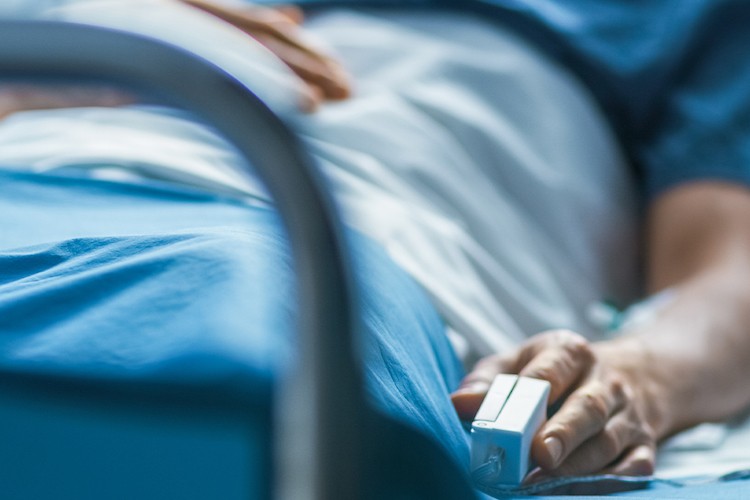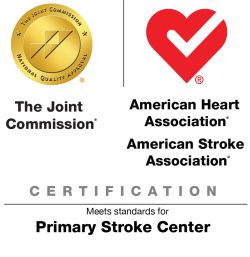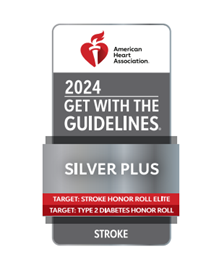Stroke Center

Strokes are Medical Emergencies. BE FAST! Call 911.
A stroke or “brain attack” occurs when blood flow to the brain stops due to a clot (ischemic stroke) or bleeding from a blood vessel into the brain (hemorrhagic stroke). Within seconds, brain cells start to die causing brain damage. The brain is like a map with different parts of the brain controlling different parts of the body. Symptoms of a stroke may vary due to what part of the brain is affected.
Are you at risk for a stroke?
Next Steps
Stroke Support Group
Connect with other stroke survivors and caregivers, finding support, empathy and compassion.
Find a Doctor
Patients should work with their doctor to reduce their personal risk of a stroke.
Sudden Symptoms of a Stroke - BE FAST
B.E. F.A.S.T. — the Balance, Eyes, Face, Arm and Speech Test
- BALANCE. Sudden dizziness, loss of balance or coordination
- EYES. Sudden trouble seeing out of one or both eyes
- FACE. First, check for facial weakness
- ARMS. Next, check for arm weakness
- SPEECH. Check for impaired speech
- TIME. Immediately call 911

Stroke Prevention
Up to 80% of Strokes CAN be prevented by working with your doctor to reduce personal risk. Risk factors to control are:
- Know your blood pressure. High blood pressure is the biggest stroke risk factor if left untreated.
- Identify atrial fibrillation (AFib). Irregular heart beats may cause clots to form in the heart which can lead to a stroke.
- Stop smoking. Smoking doubles the risk of stroke.
- Control diabetes. Make sure your blood sugar level is under control and follow doctor’s advice.
- Know your cholesterol number. Control with diet, exercise and possibly medication.
- Exercise. Eat healthy and increase your activity. 30 minutes of exercise for five or more days each week is recommended.
- Recognize and treat sleep apnea. Individuals with sleep apnea have double the risk of stroke than those without sleep apnea.
- Manage diet/decrease salt intake. Eat healthy cutting down on salt and fat in your diet.
- Decrease alcohol intake. Heavy drinking can increase risk for stroke.
Women and Strokes
- 55,000 more women than men have strokes each year
- Stroke kills twice as many women as breast cancer every year
- Women have more disability after a stroke
Women May Have Additional Stroke Symptoms
- Sudden face and limb pain
- Sudden hiccups
- Sudden nausea
- Sudden general weakness
- Sudden chest pain
- Sudden shortness of breath
- Sudden palpitations
Stroke Risk Factors Unique to Women
- Taking birth control pills.
- Preeclampsia and eclampsia during pregnancy increases stroke risk later in life.
- Hormone replacement therapy. Hormone therapy that includes estrogen and progesterone to relieve menopausal symptoms.
- Thick waist and high triglycerides. Waist greater than 35.2 inches and triglyceride level higher than 128 mg/L.
- Migraine headaches especially with auras. Increase stroke risk 3 to 6 times.
Joint Commission Certified Primary Stroke Center
Twin County Regional Hospital is a Certified Primary Stroke Center and offers services for diagnosing and treating stroke patients.
- Emergency Services - performs rapid identification of strokes and provides current treatment options.
- Teleneurology - patients are evaluated by skilled neurologists specializing in stroke via the latest telemedicine equipment.
- Diagnostic Imaging - provides emergent CT scanning 24/7. Able to perform Magnetic Resonance Imaging (MRI).
- Stroke Unit - provides individualized stroke care and education.
- Rehabilitation Services - provides physical therapy, occupational therapy and speech therapy in the hospital and outpatient setting.

Get With The Guidelines-Stroke Gold Plus Quality Achievement Award
At Twin County Regional Healthcare, we’re committed to providing stroke care that aligns with the latest research treatment guidelines. Studies show patients can recover better when these guidelines are consistently followed. We’re proud to be recognized by the American Heart Association for our achievement in the Get With The Guidelines®-Stroke and Target: Stroke quality programs. Another way Twin County Regional Healthcare is working to improve healthcare for you and your family.

For additional information, please call 276.236.1612 or send an email to Carla.Gunter@LPNT.net.
This group is open to stroke survivors, caregivers and anyone who would like information. To learn more, please call 276.236.1612.
